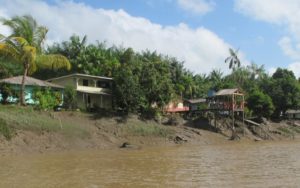
This November, two pieces of good news have come from Brazilian communities that are working with the sustainable management of their forests.
The Bailique Archipelago communities, in the State of Amapá, at the mouth of the Amazon River, have recently been visited by the Forest Stewardship Council (FSC) for an evaluation of how they manage their açaí trees. The community is committed to using its local knowledge to make the region economically viable and sustainable.
Another community, organized as a cooperative, Cooperativa Mista Agroextrativista Nossa Senhora do Perpétuo Socorro do Rio Arimum (Coomnspra), at Porto de Moz, Pará State, has received its certification from FSC for its timber production activities. It is the seventh community-managed forest project to receive that certification in Brazil. The certification verifies that logging in the community follows sustainable practices and respects both the community and the environment, allowing both to benefit.
Tenure is an important issue in Bailique, especially since its community members do not have legal recognition of their rights to the lands and resources they depend on. Last year, the Federal Prosecutor Office recommended that land use and conservation agencies analyze the tenure situation and come up with solutions. The community has since been discussing the issue among its members and with government agencies. As a result, preliminary documents have been issued, and a public hearing will take place early in 2017 to define the ways to go ahead with tenure definition.
A few years ago, some of the communities in Bailique became the first in Brazil to develop a Community Protocol under the terms of the Nagoya Protocol on the access to genetic resources, as part of the Convention on Biological Diversity. This protocol will enable them to conduct business in a fair and equitable way. The Grupo de Trabalho Amazônico (GTA), a network of Amazonian NGOs, initiated the process in 2013. The Bailique community debated every aspect of the protocol and defined the way members will cooperate among themselves and conduct business with companies, government institutions, and partner NGOs. A good description of the process and current results can be found in this article by Roberta Peixoto Ramos, “The Bailique Community Protocol in Brazil.”
Meanwhile, the communities’ hold on lands and forests has been increasing as a result of the protocol process. The Bailique communities now have a formal understanding of their territory through the realization of collective knowledge. Community mapping is a recognized way to achieve that understanding, but exchanging information and expertise on specific resources and issues has also produced great results.
A striking example that comes to mind concerns medicinal herbs. In my first visit to Bailique, in 2014, the community held its first discussion on the subject. Less than 10 women, only one a younger community member, took part. They acknowledged that while they used and prescribed local herbs, they knew only a little about them, and that young people were not interested, as they saw no future in this practice. However, the group continued exchanging information and stirring interest in other community members and NGOs. Earlier this year, I went back to Bailique to find that the medicinal herbs group was much bigger—around 30 people—with many young members. The participants were certainly proud of what they were doing and spoke passionately not only about the herbs but also their territory.
The commitment to local knowledge of medicinal herbs among the young community members is generating opportunities for the community as a whole. For instance, an external consultant took part in the community general assembly and two members of the group decided to visit her gardens and processing facilities in South Brazil, which are part of a large health care institution. Upon their return, they started to share what they learned with other community members. In addition, four community gardens were created, and a training facility on processing natural resources was proposed and approved. Every year 20 local students will acquire new skills to work with natural resources, including medicinal herbs.
From my interactions with the community, I have the sense that a net of knowledge has been spread over the territory. Economic benefits from the Community Protocol are still emerging, but the process of building it, has made the community’s hold on its resources much stronger.
RRI Fellow Luiz Carlos Joels used to be a volunteer advisor to Grupo de Trabalho Amazônico, (GTA). He now serves as an advisor to Oficina de Lutheria da Amazônia (OELA), which has since succeeded GTA as the main Bailique partner.
This article was originally published on the blog of the Rights and Resource Initiative on December 19, 2016.
Photo by Luiz Carlos Joels
